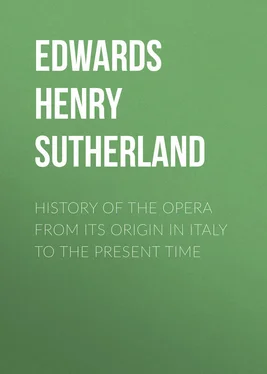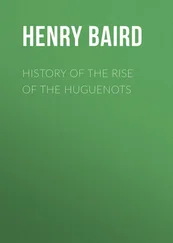Henry Edwards - History of the Opera from its Origin in Italy to the present Time
Здесь есть возможность читать онлайн «Henry Edwards - History of the Opera from its Origin in Italy to the present Time» — ознакомительный отрывок электронной книги совершенно бесплатно, а после прочтения отрывка купить полную версию. В некоторых случаях можно слушать аудио, скачать через торрент в формате fb2 и присутствует краткое содержание. Жанр: foreign_home, music_dancing, foreign_antique, foreign_prose, на английском языке. Описание произведения, (предисловие) а так же отзывы посетителей доступны на портале библиотеки ЛибКат.
- Название:History of the Opera from its Origin in Italy to the present Time
- Автор:
- Жанр:
- Год:неизвестен
- ISBN:нет данных
- Рейтинг книги:4 / 5. Голосов: 1
-
Избранное:Добавить в избранное
- Отзывы:
-
Ваша оценка:
- 80
- 1
- 2
- 3
- 4
- 5
History of the Opera from its Origin in Italy to the present Time: краткое содержание, описание и аннотация
Предлагаем к чтению аннотацию, описание, краткое содержание или предисловие (зависит от того, что написал сам автор книги «History of the Opera from its Origin in Italy to the present Time»). Если вы не нашли необходимую информацию о книге — напишите в комментариях, мы постараемся отыскать её.
History of the Opera from its Origin in Italy to the present Time — читать онлайн ознакомительный отрывок
Ниже представлен текст книги, разбитый по страницам. Система сохранения места последней прочитанной страницы, позволяет с удобством читать онлайн бесплатно книгу «History of the Opera from its Origin in Italy to the present Time», без необходимости каждый раз заново искать на чём Вы остановились. Поставьте закладку, и сможете в любой момент перейти на страницу, на которой закончили чтение.
Интервал:
Закладка:
"The Nassau, by Mr. Glover and Miss Rogers, Mr. Pelling and Miss Nona, Mr. Le Sac and Mrs. Ogden, Mr. de la Garde and Miss Batson.
"With a new dance, called Pigmalion , performed by Mr. Malter and Mademoiselle Sallé, M. Dupré, Mr. Pelling, Mr. Duke, Mr. le Sac, Mr. Newhouse, and M. de la Garde.
"No servants will be permitted to keep places on the stage."
It appears that at the King's Theatre on the night of Mademoiselle Sallé's benefit, at Covent Garden, there was "an assembly." "Two tickets," says the advertisement, "will be delivered to every subscriber, this day, at White's Chocholate House, in St. James's Street, paying the subscription-money; and if any tickets remain more than are subscribed for, they will be delivered the same day at the Opera office in the Haymarket, at six and twenty shillings each.
"Every ticket will admit either one gentleman or two ladies.
"N. B. – Five different doors will be opened at twelve for the company to go out, where chairs will easily be had.
N. B. – To prevent a crowd there will be but 700 tickets printed."
I find from the collection of old newspapers before me, that Handel, whose Ariadne was first produced and whose Pastor Fido was revived in 1734, is called in the playbills of the King's Theatre "Mr. Handell." The following is the announcement of the performance given at that establishment on the 4th June, 1734, "being the last time of performing till after the holidays."
"AT the KING'S THEATRE in the HAYMARKET, on Tuesday next, being the 4th day of June will be performed an Opera called
Composed by Mr. Handell, intermixed with Choruses.
The Scenery after a particular manner.
Pit and Boxes will be put together, and no persons to be admitted without tickets, which will be delivered that day at the Office of the Haymarket, at half a guinea each.
No persons whatever to be admitted behind the scenes.
To begin at half an hour after six o'clock."
Handel had now been twenty-four years in London where he had raised the Italian Opera to a pitch of excellence unequalled elsewhere in Europe, except perhaps at Dresden, which during the first half of the 18th century was universally celebrated for the perfection of its operatic performances at the Court Theatre directed by Hasse. But of the introduction of Italian Opera into England, and especially of the arrival of Handel, his operatic enterprises, his successes and his failures, I must speak in another chapter.
CHAPTER V.
INTRODUCTION OF ITALIAN OPERA INTO ENGLAND
Operatic Feuds. – Objections to Nose-pulling. – Arsinoe. – Camilla and the Boar. – Steele on insanity. – Handel and Clayton. – Nicolini and the lion. – Rinaldo and the sparrows. – Hamlet set to music. – Three enraged musicians. – Three charming singers.
IT was not until the close of the 17th century that England was visited by any Italian singers of note, among the first of whom was the well-known Margarita de l'Epine. This vocalist's name frequently occurs in the current literature of the period, and Swift in his "Journal to Stella" speaks in his own graceful way of having heard "Margarita and her sister and another drab, and a parcel of fiddlers at Windsor." This was in 1711, nineteen years after her arrival in England – a proof that even then Italian singers, who had once obtained the favour of the English public, were determined to profit by it as long as possible. Margarita was an excellent musician, and a virtuous and amiable woman; but she was ugly and was called Hecate by her husband, who had married her for her money.
The history of the Opera in England is, more than in any other country, the history of feuds and rivalries between theatres and singers. The rival of Margarita de l'Epine was Mrs. Tofts, who in 1703 was singing English and Italian songs at the theatre in Lincoln's Inn Fields. Instead of enjoying the talent of both, the London public began to dispute as to which was the best; and what was still more absurd, to create disturbances at the very theatres where they sang, so that the English party prevented Margarita de l'Epine from being heard, while the Italians drowned the voice of Mrs. Tofts. 11 11 I adhere to the custom of calling Margarita de l'Epine by her pretty Christian name, without any complimentary prefix, and of styling her probably more dignified competitor, Mrs. Tofts. Thus in later times it has been the fashion to say, Jenny Lind, and even Giulia Grisi, but not Theresa Titiens or Henrietta Sontag.
Once, when the amiable Margarita was singing at Drury Lane, she was not only hissed and hooted, but an orange was thrown at her by a woman who was recognised as being or having been in the service of the English vocalist. Hence considerable scandal and the following public statement which appeared in the Daily Courant of February 8th, 1704.
"Ann Barwick having occasioned a disturbance at the Theatre Royal on Saturday last, the 5th of February, and being thereupon taken into custody, Mrs. Tofts, in vindication of her innocencey, sent a letter to Mr. Rich, master of the said Theatre, which is as followeth: – 'Sir, I was very much surprised when I was informed that Ann Barwick, who was lately my servant, had committed a rudeness last night at the playhouse by throwing of oranges and hissing when Mrs. L'Epine, the Italian gentlewoman, sang. I hope no one will think it was in the least with my privity, as I assure you it was not. I abhor such practices, and I hope you will cause her to be prosecuted that she may be punished as she deserves. I am, sir, your humble servant, KATHARINE TOFTS.'"
At this period the unruly critics of the pit behaved with as little ceremony to those who differed from them among the audience as to those performers whom they disliked on the stage. In proof of this, we may quote a portion of the very amusing letter written by a linen-draper named Heywood (under the signature of James Easy), to the Spectator , 12 12 Spectator , No. 261.
on the subject of nose-pulling. "A friend of mine, the other night, applauding what a graceful exit Mr. Wilkes made," says Mr. Easy, "one of these nose-wringers overhearing him, pulled him by the nose. I was in the pit the other night," he adds, "when it was very crowded. A gentleman leaning upon me, and very heavily, I civilly requested him to remove his hand; for which he pulled me by the nose. I would not resent it in so public a place, because I was unwilling to create a disturbance; but have since reflected upon it as a thing that is unmanly and disingenuous, renders the nose-puller odious, and makes the person pulled by the nose look little and contemptible. This grievance I humbly request you will endeavour to redress."
Fifty years later, at the Grand Opera of Paris, a gentleman in the pit applauded the dancing of Mademoiselle Asselin. " Il faut être bien bête pour applaudir une telle sauteuse ," said his neighbour, upon which a challenge was given and received, the two amateurs went out and fought, when the aggressor fell mortally wounded.
In the letters of Frenchmen and Englishmen from Italy, describing the Italian theatres of the eighteenth century, we read neither of pelting with oranges, nor of nose-pulling, nor of duelling. One of the most remarkable things in the demeanour of the audience appears to have been the unceremonious manner in which the aristocratic occupants of the boxes behaved towards the people in the pit. The nobles, who were somewhat given to expectoration, thought nothing of spitting down into the parterre, and "what is still more extraordinary," says Baretti, who notices this curious habit, "those who received it on their faces and heads, did not seem to resent it much." We are told, however, that "they made the most curious grimaces in the world."
Читать дальшеИнтервал:
Закладка:
Похожие книги на «History of the Opera from its Origin in Italy to the present Time»
Представляем Вашему вниманию похожие книги на «History of the Opera from its Origin in Italy to the present Time» списком для выбора. Мы отобрали схожую по названию и смыслу литературу в надежде предоставить читателям больше вариантов отыскать новые, интересные, ещё непрочитанные произведения.
Обсуждение, отзывы о книге «History of the Opera from its Origin in Italy to the present Time» и просто собственные мнения читателей. Оставьте ваши комментарии, напишите, что Вы думаете о произведении, его смысле или главных героях. Укажите что конкретно понравилось, а что нет, и почему Вы так считаете.












